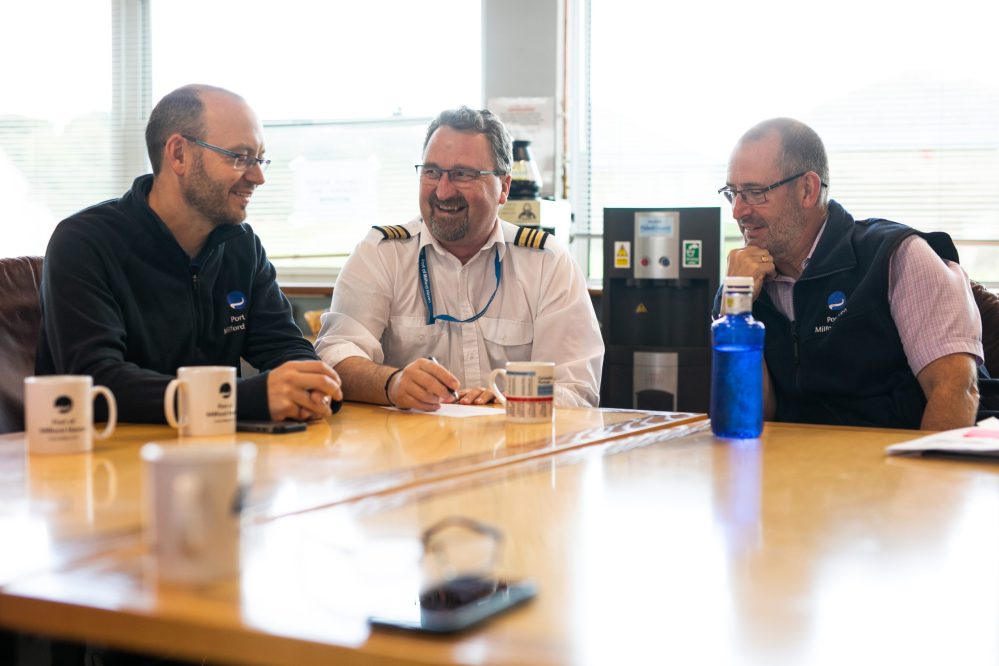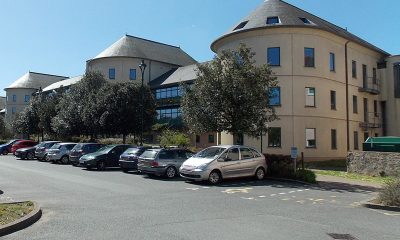Business
VAT cut critical for survival by three-quarters of small hospitality firms

IN A STARK warning to the Treasury, a sweeping survey conducted by the National Caterers Association (NCASS) has unveiled that a staggering 75% of independent hospitality businesses view a reduction in VAT as essential for their survival amidst the severe inflationary pressures besieging the sector.
In Pembrokeshire we have already seen the closure of some well known local businesses including The Welsh Bakery, Madison’s Restaurant and many more.
The survey, which gathered insights from both members and the broader independent hospitality community, paints a grim picture of the challenges faced by small cafés, restaurants, bars, hotels, and street food vendors. With a clarion call for immediate action, the results underscore the urgent need for measures to protect the livelihoods of thousands operating within this critical industry.
Discontent is rife among the respondents, with 78% expressing dissatisfaction with the level of support provided by the government. A further 80% reported that the Autumn Budget’s measures failed to offer any relief, highlighting a disconnect between policy and the practical needs of these businesses.
Alarmingly, 37% of those surveyed indicated that their operations might not be sustainable over the next year, citing a dramatic 30% decrease in gross profit. The survey also revealed unanimous concern over rising costs, including staff wages, energy bills, and rent, forcing businesses to adopt drastic measures such as reducing staff hours, increasing prices, and accruing debt to stay afloat.

One member’s testimony encapsulates the despair within the sector, questioning the viability of continuing their business under the current conditions, especially in light of what they perceive as governmental negligence.
The crisis not only threatens the existing fabric of the UK’s independent hospitality scene but also stifles the growth of emerging businesses, many of which have been instrumental in revitalizing high streets across the nation. Despite the government’s promotion of hospitality-led regeneration initiatives, the current economic environment jeopardizes the emergence of future success stories akin to established brands like Meat Liquor, Pizza Pilgrims, and Bao.
The situation is dire, with an estimated 10 businesses closing daily within the hospitality sector. The NCASS reports a doubling in the closure rate among its members in 2023, with new startups hitting a standstill.
Amid calls for intervention, the plight of these small and micro businesses underscores a broader issue: the need for a conducive operating environment that nurtures community, supports families, and fosters economic growth. The increase in VAT and corporation tax, coupled with the cost-of-living crisis, has left many businesses operating on razor-thin margins, if any.
Highlighting the perverse incentive created by the current VAT threshold, which has not been reviewed since 2016, the NCASS argues for a recalibration to account for inflation and ease the burden on businesses teetering on the brink of viability.
The plea for a fairer VAT rate is a testament to the sector’s resilience and innovation, especially in the wake of the COVID-19 pandemic. With the treasury benefiting from increased tax receipts due to inflationary pressures, there’s a compelling case for leveraging this fiscal space to support the independent hospitality sector, thereby safeguarding high streets and the very essence of local communities.
As the industry stands at a crossroads, the consensus is clear: a reduction in VAT could be the lifeline needed for these businesses to weather the storm and contribute to the UK’s economic and social fabric. The government’s response, or lack thereof, could very well determine the fate of countless independent hospitality ventures teetering on the edge of survival.
Business
Port of Milford Haven now official ‘a great place to work’

THE PORT of Milford Haven has been officially accredited as a Great Place to Work-Certified™ organisation. As the first Port Authority in Britain to secure this Certification™, it is a significant achievement.
“We are very proud to be Great Place to Work-Certified™,” said Vidette Swales, HR Director at the Port of Milford Haven. “It means so much that our employees have reported a consistently positive experience with their colleagues, their leaders and their jobs. Offering a positive employee experience is not only beneficial for the people who work with us but is also key for our continued business success.”
Tom Sawyer, CEO at the Port of Milford Haven added: “Our team is operating the UK’s leading energy port, and it is of the utmost importance that we do that safely, responsibly and effectively. We’re striving for excellence and aim to provide a world class service to our customers as well as supporting sustainable coastal communities for the prosperity of future generations. Our employees are clearly at the centre of this which is why I’m delighted that they feel supported in their role. I’m especially proud that this Certification™ demonstrates our core values of Safety, Excellence, Collaboration and Sustainability so perfectly.”
“We congratulate the Port of Milford Haven on achieving their Certification™,” said Benedict Gautrey, Managing Director of Great Place to Work® UK. “Organisations which put the employee experience at the heart of their business gain their employees’ trust and, in turn, are truly able to build a great workplace culture that delivers outstanding business results.”
Find out more about careers at the Port of Milford Haven here: www.mhpa.co.uk/about/careers-at-the-port/.
Business
One in five now accessing Ogi’s Wales-based full fibre network

Welsh full fibre telco – Ogi – has reached two thirds of its planned first phase rollout with one in every five premises now signed up to one of its home or business services.
Kick starting its ambitious FTTP [Fibre to the Premises] rollout in 2021, Ogi propelled onto the UK telcomms scene with a £200million plan to bring full fibre to south Wales much sooner than planned by the incumbent operators.
The business shifted its approach at the beginning of 2024 to focus on customer take-up – attracting thousands to the full fibre switch thanks to a new competitive pricing and shorter-term contracts strategy.
Gaining first mover advantage in places like Pembrokeshire and the post-industrial towns and villages of the south Wales valleys, the fresh approach has served the provider well, with a sector-leading high customer satisfaction score to match. This comes following a targeted period of investment in back office operations and customer service, with new 7-day opening hours and refreshed online resources among the changes introduced earlier this year.
Amid rising competition from the UK’s largest telcos, increasing build costs and other market pressures, the Gigabit-capable provider continues to see customer adoption increase, with one in five joining the network in 2023, with places like Pembrokeshire seeing double that rate of growth.
Chief Executive Officer, Ben Allwright, said: “With one in five of the premises we can serve already signed up to Ogi, it’s clear to see we’re investing in the right places. Passing the 100,000 premises milestone – two thirds of our initial plan, completed – and seeing the massive benefits from this technology as adoption increases is encouraging.

“Putting our ISP operations first since the start of the year, and harnessing the build machine as a tool for growth has allowed us to take a breath, and make sure we’re doing the right things for our customers and long-term sustainability. While we might not be as visible installing new network as we had been – we’ve been busy in the background, supporting our existing customer base and welcoming thousands more every month.
“We’re building something really exciting here at Ogi; and the people of Wales are invested in our journey to create a real challenger brand – one that Wales can be proud of, and others are already envious of.”
The network is currently being rolled out in around 60 towns and villages across south Wales, with thousands of customers joining the full fibre ISP every month. The Wales-based telco offers broadband and phone services for home and a suite of IT, connectivity and security options for business, with a new wholesale opportunity recently added to the portfolio for high capacity users.
Business
Carmarthenshire cheese factory owner speaks out in bad odour row

THE DIRECTOR of a mozzarella factory which supports 140 dairy farmers has insisted he wants to be a good neighbour following complaints from a small number of people about noise and odour.
Steve Welch, of Dairy Partners Ltd, said acoustic barriers were installed in February to dampen the noise of liquid natural gas (LNG) deliveries at the site in Aberarad, near Newcastle Emlyn, Carmarthenshire. He said the company employed 75 people and served a growing market. “We’re expanding – that’s an indicator of our success,” he said.
Environment regulator Natural Resources Wales (NRW) had visited three months earlier, in December 2023, and found that the noise of pressurised LNG deliveries did not comply with Dairy Partners’ site permit. The NRW officer’s report said there was “an offensive and continual tonal noise originating from the direction of LNG tanker and LNG tank”, but no odour problem was detected.
NRW issued what’s known as a compliance assessment report in February this year requiring the company to take action. The regulator said this wasn’t the same as a formal enforcement notice, and that it was continuing to monitor noise and undertaking “detailed dialogue” with Dairy Partners.
Mr Welch said the LNG supplier it had been using exited the market last autumn. This supplier, he said, had a “silent” gravity-fed tanker which took six to eight hours to complete its delivery. He said all the available alternative LNG suppliers used a pressurised delivery system which was quicker, reduced the risk of spillage and was more economically viable. The company switched to the pressurised delivery system, which led to complaints about the accompanying noise.
Mr Welch said Dairy Partners tried using different tankers and built a wooden pallet stack to try to mitigate noise before investing in the sound-dampening panels, which he said made a big difference. He added that Dairy Partners was working with NRW to modify its site permit to reflect the use of the pressurised LNG deliveries.
Site manager Daryl White said liquid natural gas powered the factory and that there was one delivery per week during daytime hours between Monday and Friday, lasting one hour.
Dairy Partners measures the decibel level of LNG deliveries and Mr Welsh said the noise rated as “moderate to soft” when heard at the nearby roadside. A resident living just across the road, Megan Ceiriog-Jones, said she had recorded a higher decibel level, and that the sound of other operations such as night-time “venting” which she had recorded on video were disruptive. “The noise videos are just a sample of noise complaints that are sent to NRW on a regular basis,” she said.
Dairy Partners said further noise-dampening measures would be added as a condition of planning approvals for wastewater and cleaning tanks which were decided by Carmarthenshire Council’s planning committee last month. A handful of objectors opposed the retrospective applications, including Ms Ceiriog-Jones and Stephen Rees, who both addressed the committee. Ms Ceiriog-Jones said the effects of “noise and sleeplessness are hard to quantify”, while Mr Rees said the reality for residents living by the cheese factory was “considerable disruption”. Ward councillor Hazel Evans addressed the committee to say that Dairy Partners was a large contributor to the local economy and that she was reassured by the many planning conditions proposed by the planning department. She said she understood that some nearby residents weren’t happy, although they didn’t wish to see the factory close.
Speaking to the Local Democracy Reporting Service, Mr Welch said the company logged all complaints, had attempted to talk to Ms Ceiriog-Jones, and wanted to have a positive relationship. He said: “We want to be good neighbours.”
Mr Welch said cheese had been made at the site since 1938, with previous owners including Canadian firms Saputo and McCain Foods, and an Egyptian family business.
Site manager Mr White said the factory was “on its knees” when Dairy Partners took over in 2013 and began investing in it and increasing production.
Every year around 200 million litres of milk arrives at the site from 140 nearby dairy farms. Nine hours after arriving the milk is turned into 2.5kg blocks of mozzarrella cheese, with the separated whey sent to another company where it is dried and sold in powdered sports nutrition products. Cream is also produced at the Aberarad site.
“Making cheese is really technical,” said Mr Welch, who is one of three Dairy Partners directors. “You’te taking milk and turning it into a stretchable cooking product which has a lot of different characteristics. You’re manipulating proteins, sugars and minerals in a reproducible product.”
Varying levels of salt can be added to the cheese blocks, which move slowly along a tray system in a brine solution before being packaged ready for onward delivery. Around a third of it ends up overseas in countries including Lebanon and China.
Mr Welch said the site produced around 22,000 tonnes of mozzarella and pizza cheese per year, and that it hoped to expand this to as much as 35,000 tonnes. He said the 75 jobs were highly skilled and that many more indirect jobs relied on the site. Mr White said haulage business Mansel Davies & Son had around 40 drivers who delivered to and collected from the Aberarad site.
Dairy Partners, which also has a base in Gloucestershire where its cheese is shredded, has an annual turnover of around £140 million. “The market is expanding – we can’t keep up,” said Mr Welch. “We’ve got to keep producing, and we are never going to be silent.”
-

 News4 days ago
News4 days agoPolice investigating after woman found dead on beach near Pennar
-

 News4 days ago
News4 days agoPolice discover body in search for Luke Stephenson, 19
-

 News4 days ago
News4 days agoCouncillors block Milford Haven boxing event – promoter to appeal
-

 Crime5 days ago
Crime5 days agoLlandissilio man accused of making hundreds of child abuse images
-

 News3 days ago
News3 days agoBeautiful, funny and lovely: Family pay tribute to Sian Batchelor
-

 Business5 days ago
Business5 days agoLidl GB eyes Pembroke Dock for new larger supermarket
-

 News5 days ago
News5 days agoSearch efforts continue for missing teenager Luke Stephenson
-

 Politics6 days ago
Politics6 days agoFears new 4G phone mast would impact on historic building























